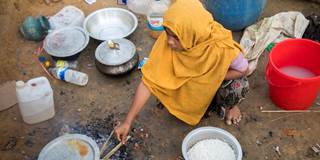Malnutrition is rising among Rohingya Muslims who fled violence in Myanmar for safety in neighboring Bangladesh. With despair in the refugee camps deepening, only the swift delivery of food aid and other resources can ensure that the indignity of displacement does not lead to even greater human suffering.
COX’S BAZAR – The Rohingya refugee camp in the Bangladeshi port city of Cox’s Bazar is a sea of metal roofs as far as the eye can see, shimmering under an unrelenting sun. Mohammed, a 60-year-old resident, greets me outside his new home and thanks me in breathless rasps for our support. He suffers from a larynx disease, one that could easily be treated with a surgery that he cannot afford. But he is simply grateful to be alive, and far away from the torture and misery he left behind in Myanmar.

COX’S BAZAR – The Rohingya refugee camp in the Bangladeshi port city of Cox’s Bazar is a sea of metal roofs as far as the eye can see, shimmering under an unrelenting sun. Mohammed, a 60-year-old resident, greets me outside his new home and thanks me in breathless rasps for our support. He suffers from a larynx disease, one that could easily be treated with a surgery that he cannot afford. But he is simply grateful to be alive, and far away from the torture and misery he left behind in Myanmar.